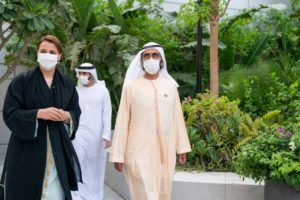São Paulo – The emirate of Dubai launched on Saturday, May 1, the Food Tech Valley, which seeks to triple the United Arab Emirates’ food production. The initiative was launched by Mohammed bin Rashid Al Maktoum, vice president and prime minister of UAE and ruler of Dubai, and is a partnership between the Ministry of Food and Water Security and Wasl Properties firm, Gulf Business newspaper reported.
The initiative aims at helping the UAE meet its National Food Security Strategy 2051 targets. In the initial phase of its launch, the Valley will focus on strategic projects to achieve food self-sufficiency, while ensuring sustainability and conservation of resources, said Mariam Almheiri, UAE’s minister of State for Food and Water Security.
The Food Tech Valley will be home to four clusters: agricultural technology and engineering, a food innovation center, research & development (R&D) facilities, and a smart food logistics hub.

The agricultural technology and engineering cluster will have a vertical farm that will employ the latest food technologies to grow year-round vital crops. The cluster will also focus on developing innovative projects in bioengineering, automation, robotics and artificial intelligence and supporting capacity building across the food ecosystem.
Meanwhile, the food innovation center will provide an integrated agri-business ecosystem to incubate promising ideas and support startups and entrepreneurs. The cluster, which will have a specialized food factory to produce new foods and second-generation restaurants (restaurants 2.0), will explore models that are based on sustainability and production sufficiency to reduce consumption and wastage of resources.
The third cluster will have world-class R&D facilities to train food specialists and support food establishments. The facilities will explore the use of agri-robotics to maximize yields and drought-resistant crops. Specialized researchers will also explore the application of 3D printing in algae cultivation and alternative protein production. The R&D facilities will also study the use of artificial intelligence to monitor, analyze and manage agricultural crops, and detect environmental impact and climate change.
The fourth cluster will feature a fourth-generation food storage system that provides smart and automated logistical storage services. The smart storage system will apply blockchain technologies and big data in sorting, transporting and distributing various food products. It will track food quality, origin, components, processing methods, storage and delivery to ensure efficiency of food supply chains.
“[The Food Tech Valley project] will be an economic zone, which is particularly significant considering that the size of the AgTech market is projected to grow from USD 13.5 billion to USD 22 billion over the next four years. The project is part of our efforts to achieve our strategic national goals with respect to food security, as it constitutes an incubator for advanced farms,” said Mariam Almheiri.
The innovation center has been designed to resemble a head of wheat (pictured above). It’s strategically located close to universities and academic institutions.
According to the Ministry of Climate Change and Environment’s 2019 figures, the UAE has more than 177 advanced farms that use modern agricultural technologies and hydroponics, and over 100 entities that implement organic farming across the UAE. The country currently hosts over 500 specialized food processing companies that supply to local markets and export globally.
Translated by Guilherme Miranda




